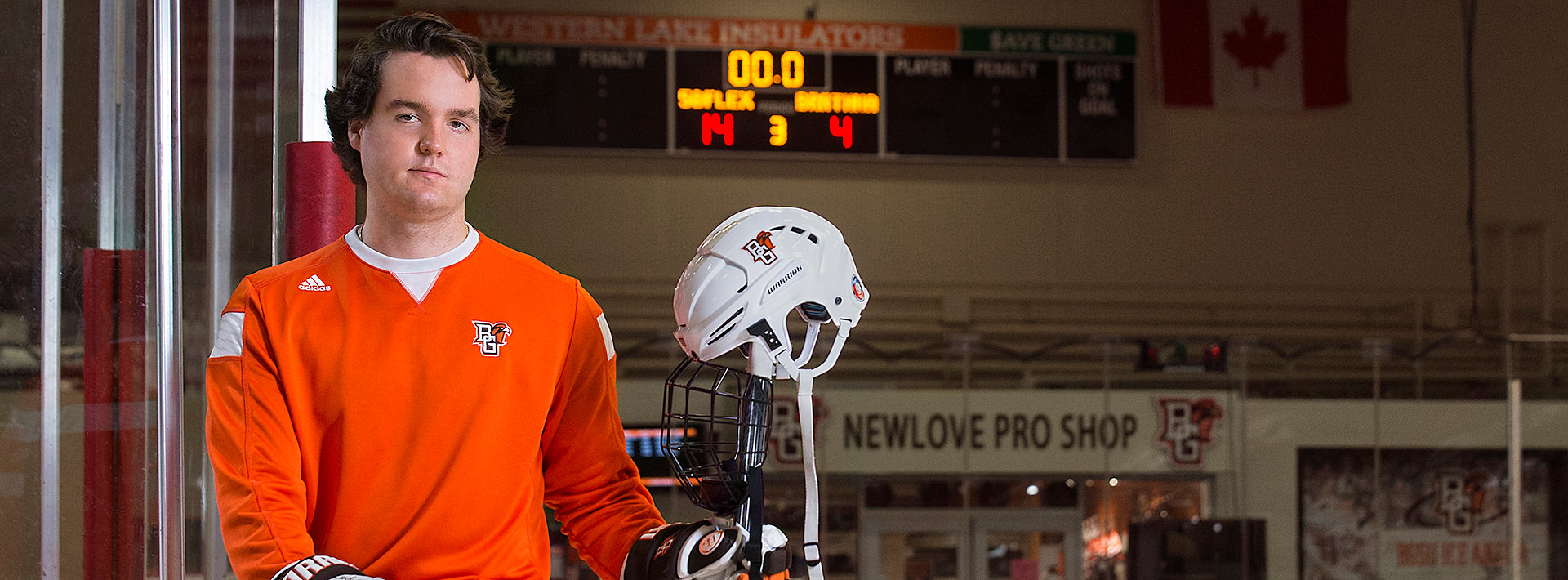Against All Odds
Student, former hockey standout overcomes devastating diagnosis

By Matt Markey
Duke Pieper was on top of his hockey world late in 2008, and headed even higher. As a 15-year-old freshman, he had skated into rarified air by making the varsity starting lineup for perennial Minnesota high school powerhouse Hill-Murray.
He seemed destined for four years of prep glory and a certain scholarship to one of the premier programs in Division I college hockey. But, before he could take the ice in his first game, persistent headaches and problems with his vision sidelined Pieper.
The diagnosis shocked everyone around him—bleeding in his brain from a non-cancerous lesion. The prognosis stunned them. Duke would need surgery that afforded him only a slim chance of survival.
What followed was more than any 15-year-old should ever be expected to endure: a half dozen extremely risky surgeries and procedures involving his brain and spine, bouts of paralysis, multiple complications, and the temporary loss of his speech.
“I guess I was really close to death several times, and I was looking at being paralyzed if I did survive,” Pieper said. “There’s about two years of my life I missed, being in the hospital all of the time, rehabilitating and going through a lot of medical stuff. Those were tough times, but I just had to fight through them.”
Those toughest of times are in the rearview mirror for Pieper today, as the 21-year-old works toward a degree in sports management with a minor in entrepreneurship. He has regained enough of his health to take a couple of classes each semester at BGSU, but he contends it is his continued association with hockey that has really allowed him to live again.
Pieper is a volunteer student coach with the Falcon hockey team, attending practices and games, watching video, sitting in on team meetings, and compiling stats for the coaching staff. He is not on the ice, but he is close enough to feel its comforting power.
“Before this all happened, hockey was a huge part of my life. It was all I really knew,” Pieper said. “It was a part of me before, so it was really important to find a way to stay close to the game. I had to keep it a part of my life.”
“Everything he wanted to do was all laid out in front of him, and then in an instant it was taken away,” said Jimmy Spratt, BGSU’s director of hockey operations. “But now here he is, around the team, helping out any way he can. Hockey is a part of him, and he absolutely has a place in this program.”
Bill Lechner was Pieper’s coach at Hill-Murray, where a freshman player poised to start on the varsity is a unique talent. As it turned out, Pieper the person was even more rare.
“I don’t know if there are the right adjectives out there to describe what an amazing young man he is. One week here is this big, strong kid getting ready for first game of his high school career, and the next minute he is hanging on for his life. We were preparing for his funeral,” Lechner said.
“But the way he fought through this and worked his way back has been one of the greatest examples of not giving up. It was an eye-opener for the other kids in our program, and we still talk about it. Duke gave them all a real lesson in resilience.”
Spratt said the BGSU hockey team gets a similar benefit from the presence of Pieper.
“I think a lot of people in that same situation would probably be real negative and bitter and have a chip on their shoulder for the rest of their life, but to his credit Duke is a real positive, ‘glass is half full’ type of guy and a positive influence on everyone.”
Lechner said that once Pieper was healthy enough, he stayed involved with the high school program as a manager, and Lechner is thrilled that once Duke headed off to college, Bowling Green gave him the opportunity to maintain that relationship.
“I think it is so important to keep hockey in his life, and it is really cool that BG has done that,” Lechner said. “Those things that you know and love give you a purpose.”
Looking back, Pieper said he can’t believe what he went through, but said he never once took the time to feel sorry for himself.
“That doesn’t get you anywhere,” he said. “If adversity comes your way, you can sit in the corner and cry, or you can do something about it. I had to battle through some things, but I’m glad I did. Everyone here treats me great, and I feel like I’m in a really good place now.”
Pieper has put together a book on his ordeal, which will be published later this year. He hopes it will help other people who are facing struggles of their own. And he did not get cute or fancy with the title. Quite appropriately, he calls his story, “I’m alive.”
Updated: 12/02/2017 12:43AM
